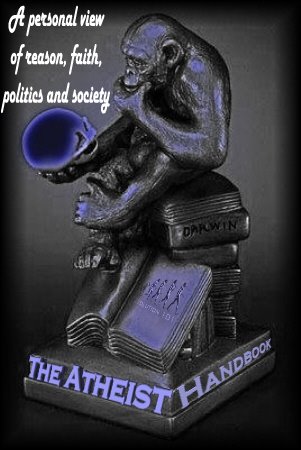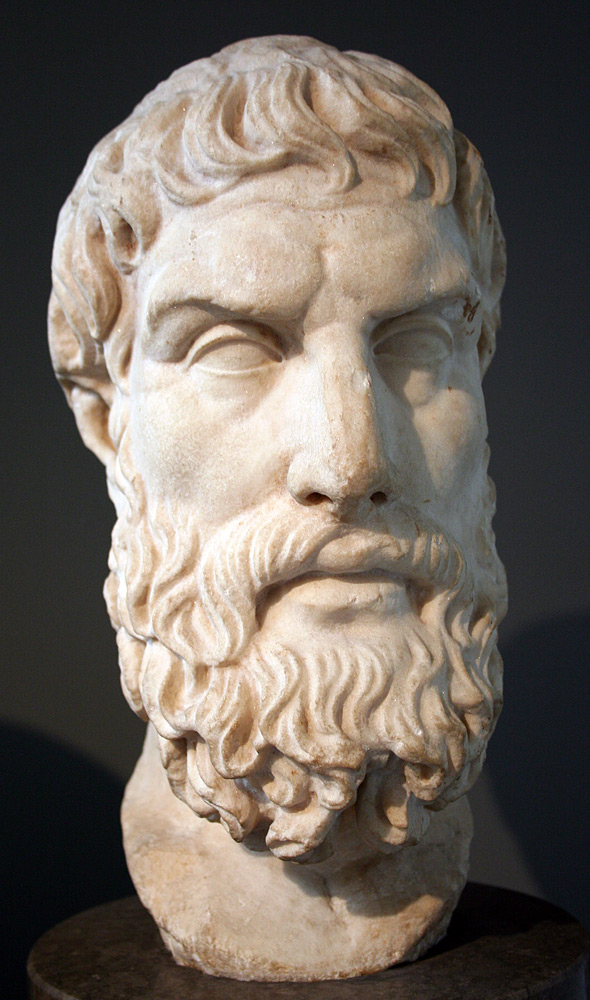
Do not accept what you hear by report, do not accept tradition, do not accept a statement because it is found in your books, nor because it is in accord with your belief, nor because it is the saying of your teacher.
Be lamps unto yourselves.
Those who, either now or after I am dead, shall rely upon themselves only and not look for assistance to anyone besides themselves, it is they who shall reach the topmost height.
-The Buddha
Many years ago, these words are what drew me to Buddhism. Long before I first read them I had given up any pretense in believing in a God or gods. Mostly on the grounds that there was no evidence. The credibility of books like the Koran or the Bible come from, well....the Koran or the Bible. Basically you believe because the books says you should believe, and you know the book is true because the book says it is. That kind of circular logic never convinced me of anything, even as a young person. By the time I hit high school, a Catholic school no less, I came to accept that there is no more or less reason to believe in the Trinity, or Allah, the great juju atop the mountain, or the invisble pink unicorn for that matter.
There just wasn't any evidence. None at all.
What Buddhism was saying though was much different that the Koran or the Bible, both of which claimed absolute truth because of its own purported authority. Buddhism was saying "do not accept anything blindly, test your conclusions against the life, and if you turn out to be wrong, adjust your thinking and move on." It seemed, well, a kind of kin to the scientific method.
Moreover, it's ethical teachings were based on a notion that you are good toward other people because, well, it is good to be good. This seemed to make far more sense than the Abrahamic God - whose own ethical behavior in the Old Testament is often completely evil - who orders you do to good OR ELSE! Duh duh duh! You do good in that case, essentially, out of fear. But what Buddhism was saying was you do good because it is right to do it. It came down to compassion vs. righteousness. Doing good for its own sake, vs. doing good because if you don't you will be punished...forever.
It all made sense. It seemed totally rational. But for one thing.
Reincarnation.
Now I can justify reincarnation using physics. Matter and energy are never destroyed, only transformed, etc. So our bodies decompose and became part of the life cycle again. And it is true the Buddha himself said almost nothing about what happens after death. Reincarnation was a kind of inheritance from Hinduism.
But here is the fact. Reincarnation, as a notion you are are reborn again and again because of a cosmic law of karmic cause and effect, is in the final analysis, as untenable as the God hypothesis. There is no evidence. No proof that if I behave badly, I will be reborn as a dung bettle, or if I behave well, I will be a well off human person.
So certainly I still hold to the ethical teachings, and accept the benefits of meditation - there is nothing supernatural about any of that. This being the case, is a Buddhist automatically an atheist, or is possible to be an atheist and a Buddhist?
Maybe more to the point - does the label "Buddhist" really mean anything if one takes the above quotation from the Buddha himself seriously?
There just wasn't any evidence. None at all.
What Buddhism was saying though was much different that the Koran or the Bible, both of which claimed absolute truth because of its own purported authority. Buddhism was saying "do not accept anything blindly, test your conclusions against the life, and if you turn out to be wrong, adjust your thinking and move on." It seemed, well, a kind of kin to the scientific method.
Moreover, it's ethical teachings were based on a notion that you are good toward other people because, well, it is good to be good. This seemed to make far more sense than the Abrahamic God - whose own ethical behavior in the Old Testament is often completely evil - who orders you do to good OR ELSE! Duh duh duh! You do good in that case, essentially, out of fear. But what Buddhism was saying was you do good because it is right to do it. It came down to compassion vs. righteousness. Doing good for its own sake, vs. doing good because if you don't you will be punished...forever.
It all made sense. It seemed totally rational. But for one thing.
Reincarnation.
Now I can justify reincarnation using physics. Matter and energy are never destroyed, only transformed, etc. So our bodies decompose and became part of the life cycle again. And it is true the Buddha himself said almost nothing about what happens after death. Reincarnation was a kind of inheritance from Hinduism.
But here is the fact. Reincarnation, as a notion you are are reborn again and again because of a cosmic law of karmic cause and effect, is in the final analysis, as untenable as the God hypothesis. There is no evidence. No proof that if I behave badly, I will be reborn as a dung bettle, or if I behave well, I will be a well off human person.
So certainly I still hold to the ethical teachings, and accept the benefits of meditation - there is nothing supernatural about any of that. This being the case, is a Buddhist automatically an atheist, or is possible to be an atheist and a Buddhist?
Maybe more to the point - does the label "Buddhist" really mean anything if one takes the above quotation from the Buddha himself seriously?
















12 comments:
Hi, I was born to buddhist parents so for a large part of my life i thought of myself as a buddhist. But as you seem to have done i could never get my head around the concept of reincarnation. But i have to disagree with you on one thing you said "But what Buddhism was saying was you do good because it is right to do so". This has not been my personal experience. Because in almost all the preachings i have heard by buddhist monks no less, it has come down to doing good deeds to escape from the vicious cycle of being born, suffering and dying and then being born once again to continue the cycle. But nevertheless we shall agree that buddhism too is riddled with problems stemming mainly from the monks and buddhist institutions that are trying to make sure that there stomachs arent hurt by telling the word of buddha as it is. So many of the problems of buddhism are not there in studying the buddha as a philosopher and his sayings alone.
There are, indeed, Buddhists who teach that doing good is merely the path to escape Samsara. I know this. However, my own instruction was that if you did something good with the purpose of mind to escape Samsara, in other words for own sake, then it ceases to be "good" deed and become a selfish one, even if said deed helps others. This is a view, by my experience, more common in Zen/Ch'an circles than in Hinayana schools of Buddhism.
Of course, Buddhism is riddled with metaphysical problems precisely for the reason you note...that monks turned a philosophy into a metaphysical proposition. And of course, once something becomes institutionalized, there are those who ultimately will use it for their own ends.
My own ultimate rejection of Buddhism is as a religion as its metaphysical claims lack evidence. It's ethics, however, I still find very important.
Yes exactly, the fact that if you do a good deed to try and escape from the sansara then the deed becomes a selfish one this is one of the many points i have brought up with my colleagues when i have tried to create conversation on this issue. I am from Sri Lanka where theravada buddhism is practiced and i have had little exposure to zen buddhism may be this is the reason, as your experience tells you, that our instructions have varied.
I agree with your statement that the ethics of buddhism is very important that is what i was trying to say when i said studying the buddha as philosopher and his sayings alone. I should have said moral sayings alone rather than confusing the metaphysical claims. Thank you for your fast follow up .
Your understanding of karma and reincarnation is lacking. Continue your studies, and have "faith" that metaphysical, cultural trappings of institutional Buddhism will fall away.
You cannot be reborn as a dung beetle. There is no you. There is no beetle. You are already a dung beetle.
A candle lights another candle, which then passes its flame to a third and similarly to a fourth. What relationship does the 20th flame have to the first? (It's a metaphor...dont get lost in the physics of combustion.)
Every moment goes round the entire cycle of Samsara. The past dies and is reborn in the present. Old wive's tales of literal rebirth are simplifications meant for peasant people from first century Asia. the Buddha's teachings are immortal.
Be a lamp unto yourself. He couldnt have been any more clear.
As to your point, I believe Buddhism IS an atheist philosophy and have come to it as an atheist.
Mike;
"There is no spoon."
That is a common North American view of Buddhism and reincarnation. However, the texts are very clear on the matter. Reincarnation is not metaphor from the Buddhist perspective.
The Buddha's enlightenment was that he found a way to escape Samsara. And it was not taught differently to peasants than it was to educated people. It was the singular message of the Buddha's teaching - the escape from the cycle or reincarnation.
To suggest that reincarnation is not a literal fact, from a Buddhist point of view, is to change Buddhist teachings to suit your own point of view.
But if you take the texts at face value, then you see that reincarnation is believed to be real.
As yourself, what is Samsara without a literal rebirth? How do you decide which parts of the texts to accept as literally true and which do you not?
As there is no evidence for reincarnation, there is no reason to accept it to be true, and the metaphysical basis for the Buddha's teachings become irrelevant.
Faith is nothing more than belief without evidence.
I am an atheist, scientist, and a Buddhist. I got drawn to Buddhism because of the ethics, and also because my previous scientific views matched the Buddhist ideas of impermanence and forms. As an atheist, I had trouble with the idea of karma, reincarnation and faith in Buddhism...until I read and heard some things. Buddhadasa Bhikkhu discusses karma and rebirth in a beautiful clear way in his talk "No religion" (transcript available online). It's really worth looking at if you are an atheist who doesn't like supernatural explanations. Also, Gil Fronsdal gave a great dharma talk on faith in Buddhism, and the recording is available on iTunes (Audio Dharma podcast, "Saddha - Faith - Knowledge (Gil Fronsdal)"). Gil talks about faith as confidence that precedes knowledge, and motivates us to seek knowledge. So, it's not faith in the Western sense, but more like saying "Ok, this is worth looking into. There's something there, so I will think about it." If you pick up a heavy box, you have "faith" that there is something inside. If you didn't, you wouldn't bother opening the box. As a biologist, I believe that kindness to other living beings is necessary for our survival, because the ecosystem is connected. The reason I like Buddhism so much is that it doesn't tell me why I should be kind and loving, but it makes me think about what it is that prevents me from being so all the time. I think this question is very important.
Ksitigarbha Girl;
Thank you for your interesting and thoughtful reply.
I am indeed aware of Buddhadasa Bhikkhu and his teachings and in point of fact, the reasons you put forward for being attracted to Buddhism are pretty much the same reasons I was as well, and why my ethics continue to be informed by Buddhism.
However, I now tend to regard reincarnation and karma, as presented by the Buddha, as either being true or not. Either we are reborn into the cycle of samsara and through the Eightfold Path can escape it, or not. And in this respect the metaphysical claim of Buddhism is just as suspect as the Christian claims about God. There is just no evidence.
One can approach reincarnation as some kind of metaphor, I suppose. But then one ends up as guilty as theists who pick and choose what is literal or not from the Bible or Koran depending on their own personal views.
Either it is true or not. And it is pretty clear from the texts that the Buddha regarded them as true. Reincarnation was real. Karma was real. Yet we have no evidence to support either claim. So again, while I still regard Buddhist ethics and morals as excellent and superior to Christian ones in every respect, I reject the label of Buddhist because the claims the religion makes about reality are not borne out by evidence.
Hi. I am a grad student in biology in Montana. I have been reading Dawkins, Hawking and listening to Lawrence krauss these days. I turned from a believer to a TAP 5.5 recently (-1.5 from an atheist's scale of 7 owing to my limited understanding of origin of matter/energy). I may label this current phase of my life as - existential crisis, perhaps, as a by product of emptiness of nothingness that most likely lies ahead. Considering the readership of this blog, it appears pointless to mention that the next step in my reading list is Jean Paul Sartre and Epictetus. For quite some time, I have been looking for an unbiased non-religious philosophical view of Buddhism and I was wondering if anyone here could suggest a reading worth the time, something written by an intellectual of the likes of Dawkins (considering that fact that I am a mere first year PhD student with zillions of things on my plate). Thanks.
hotbacteria: why don't you try Stephen Batchelor's "Buddhism without Beliefs." You might find it interesting
http://www.amazon.com/Buddhism-Without-Beliefs-Contemporary-Awakening/dp/1573226564
What's in a name? that which we call a rose by any other name would smell as sweet.
Call yourself a Buddhist if you wish, or don't. Call yourself an Atheist if you wish, or don't. Atheist Buddhist might convey the message a bit more clearly, but it's entirely up to you.
I try to only label myself if I'm in a bit too much of a rush to explain my views or I don't deem it important at the time. Within all religions and atheism as well there are multiple opinions, denominations, and schools of thought. Some think atheism is not believing in God, some think it's believing there is no God, some think it's not believing in any supernatural things at all, and some think there might be a God but not one defined by present religions. Some may be off the mark, but who's to say? Many of our definitions of things change over time and some people really don't know or have a mistaken view of the definition.
Not everyone has the same definitions as others and narrowing your religious/philosophical views to a single word probably doesn't do you justice. Just think the way you like, find your morals within yourself, and call it Grant LaFlecheism :D
The original teachings of the Buddha never preached the concept of reincarnation. Buddha was a rationalist, egalitarian and humanist whose thoughts and ideas aimed at countering and destroying the bigoted Hindu caste system which preached inferiority and superiority of human birth. But the bigoted forces behind the Hindu caste system, particularly the Brahmins, created a Hindu revival in India by massacring Buddhists and destroying Buddhist Viharas, and by converting Buddhist Viharas into Hindu temples, which resulted in the disappearance of Buddhism from India, thus entrenching the bigoted Hindu caste system. Being born into a lower caste is "justified" by bigoted Hindu scriptures on the basis of reincarnation and sins committed in past births, and this concept of karma and reincarnation was instilled into Buddhism to Hinduise and corrupt Buddhism, so that Buddhism will cease to be a threat to the bigoted Hindu caste system. Thus the atheist, rationalist, egalitarian and humanist spirit of Buddhism was compromised and corrupted by Hinduising Buddhism and by instilling the concept of reincarnation into Buddhism. People who are persecuted and oppressed as "untouchables" (Dalits) by the Hindu caste system stake claim to a rationalist, atheist, humanist and egalitarian neo-Buddhism devoid of reincarnation, on the basis of the teachings of their leader Dr.B.R.Ambedkar, and this strand of atheist, rationalist, egalitarian and humanist Buddhism is known as "Ambedkarite Buddhism" or "Neo-Buddhism". I am an atheist Ambedkarite Buddhist. The truth is that the Buddhism which is practiced predominantly the world over is a Hinduised and corrupted version of Buddhism, and is not the rationalist, atheist, egalitarian and humanist Buddhist path as originally taught by the Buddha. Buddha has also been reduced to a idol of worship which by itself is against Buddha's rationalist and atheist teachings.
Post a Comment